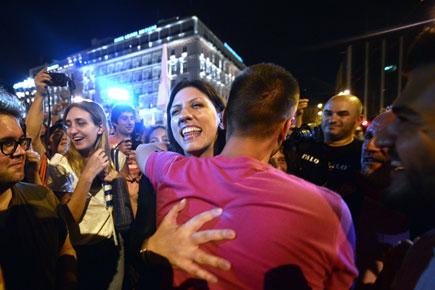Greece lurched into uncharted territory and an uncertain future in Europe's common currency after voters overwhelmingly rejected demands by international creditors for more austerity measures in exchange for a bailout of its bankrupt economy

Athens: Greece lurched into uncharted territory and an uncertain future in Europe's common currency after voters overwhelmingly rejected demands by international creditors for more austerity measures in exchange for a bailout of its bankrupt economy.
ADVERTISEMENT
![]()
Results showed about 61 per cent voted "no," compared with 39 per cent for "yes," with 100 per cent of the vote counted. The referendum Greece's first in more than four decades came amid severe restrictions on financial transactions in the country, imposed last week to stem a bank run that accelerated after the vote was called.

Greek parliament's president and Syriza party member, Zoe Kostantopoulou (C) embraces a 'NO' supporter , as she joins the celebrations in front of the parliament latein Athens on July 5, 2015. Greece's Prime Minister Alexis Tsipras said that the 'No' victory in the country's bailout referendum did not mean Athens was headed for a so-called Grexit. Pic/AFP
Thousands of jubilant government supporters celebrated in Syntagma Square in front of Parliament, waving Greek flags and chanting "No, no, no!" Early trading on Asian markets indicated investors were alarmed, as stock indexes fell.
It was a decisive victory for Prime Minister Alexis Tsipras, who had gambled the future of his 5-month-old coalition government and his country in an all-or-nothing game of brinkmanship with Greece's creditors from other European countries that use the euro currency, the International Monetary Fund and the European Central Bank.
"Today we celebrate the victory of democracy," Tsipras said in a televised address to the nation, describing Sunday as "a bright day in the history of Europe." "We proved even in the most difficult circumstances that democracy won't be blackmailed," he said.
Tsipras called the referendum last weekend, saying a "no" vote would strengthen his hand to negotiate a better deal for his country. His government has said it believes it would be possible to conclude a deal with creditors within 48 hours.
But European officials and most of Greece's opposition parties painted the referendum as one of whether the country kept using the euro currency even though that was not the convoluted question asked on the ballot. Opinion polls Friday showed that 74 per cent or more want their country to remain in the euro.
"Given the unfavorable conditions last week, you have made a very brave choice," Tsipras told Greeks in his address. "But I am aware that the mandate you gave me is not a mandate for rupture." He said he would seek to negotiate a viable solution with the country's creditors.
How European officials react to the referendum result will be critical for the country, and a eurozone summit was called for tomorrow evening to discuss the situation.
German Chancellor Angela Merkel and French President Francois Hollande spoke to each other last night and agreed "that the vote of the Greek people must be respected," Merkel's office said.
 Subscribe today by clicking the link and stay updated with the latest news!" Click here!
Subscribe today by clicking the link and stay updated with the latest news!" Click here!







